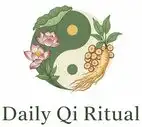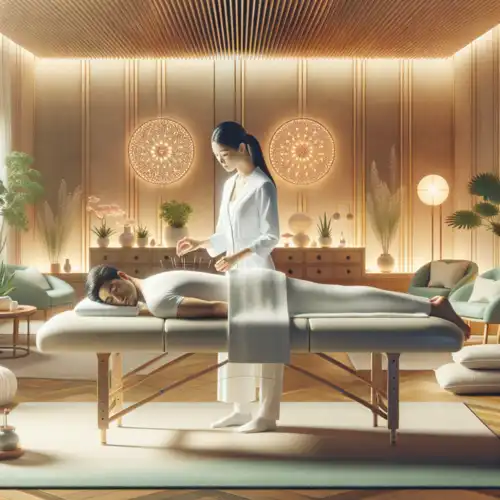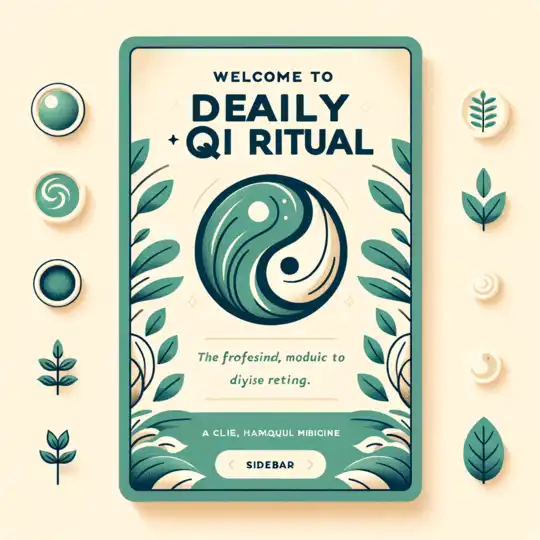Does the thought of using tiny needles to promote a profound sense of well-being intrigue you? Acupuncture, a practice rooted in Traditional Chinese Medicine, is not just about alleviating pain—it's a holistic journey that harmonizes the body, mind, and spirit. Dive into the world of acupuncture and discover how it can transform your health.
What You Will Learn
- Acupuncture promotes natural healing by targeting specific points that enhance the flow of Qi, the vital life force in our bodies.
- Understanding the principles of Traditional Chinese Medicine, such as Yin and Yang, can help you appreciate the holistic approach of acupuncture.
- A thorough initial assessment by a practitioner tailors acupuncture treatments to your unique health story and goals.
- A calm and serene environment enhances the effectiveness of acupuncture, allowing for deeper relaxation and better health outcomes.
- Meridians are the pathways for Qi flow, and stimulating these channels can lead to significant improvements in emotional and physical health.
- Community acupuncture settings foster supportive healing environments and offer a more affordable option for treatment.
- Regular communication with your practitioner enhances your experience, ensuring you feel informed and engaged during the healing process.
Core Principles of Traditional Chinese Medicine (TCM)
Here's an overview of the foundational elements that guide acupuncture practice and its holistic approach to health:
Yin and Yang
The dual forces that represent balance in the universe.
Five Elements
Wood, Fire, Earth, Metal, and Water; each element corresponds to different organs and emotions.
Qi Flow
The vital life force that flows through our bodies, crucial for health.
Impact of Qi on Health
Here are some ways Qi influences our well-being:
Maintains Energy Levels
Supports individuals to feel vibrant throughout the day.
Emotional Stability
Facilitates mental clarity and emotional balance.
Natural Healing
Facilitates the body’s ability to heal itself.
Insights into Acupuncture Clinics from a Traditional Chinese Medicine Perspective
Acupuncture is more than just a treatment; it’s a holistic approach that harmonizes the body, mind, and spirit. If you're looking for Acupuncture in Frome, you’ll find expert practitioners who blend tradition with individualized care. Within Traditional Chinese Medicine (TCM), acupuncture plays a pivotal role by using specific points on the body to encourage healing and balance. By understanding its foundation, we can appreciate how acupuncture contributes to our overall well-being.
When I think of acupuncture, I envision a gentle pathway toward wellness, where energy flows freely and health flourishes. Each needle is carefully placed to interact with the body’s energy, known as Qi. This connection forms the core of TCM, emphasizing that our health is deeply interwoven with the balance of this vital energy.
Defining Acupuncture and Its Role in Traditional Chinese Medicine
At its essence, acupuncture is a practice that involves inserting thin needles into specific points on the body. These points correspond to pathways that facilitate the flow of Qi. By stimulating these points, acupuncture helps to release blockages, restore balance, and promote healing. It’s fascinating to think that such a simple act can lead to profound changes in our health!
Traditionally, acupuncture has been used for various health issues, from pain management to stress relief. It operates on the principle that our bodies are designed to heal themselves, and acupuncture acts as a gentle nudge in the right direction. Here are some key aspects of acupuncture:
- Stimulates the body’s natural healing processes
- Promotes relaxation and reduces stress
- Balances emotional and physical health
Understanding the Basics of Acupuncture
As I delve deeper into acupuncture, it’s essential to appreciate that this practice is not merely about needles. At Daily Qi Ritual, I emphasize understanding the connection between mind and body. Acupuncture taps into this connection by addressing the root causes of discomfort rather than just the symptoms. The National Center for Complementary and Integrative Health (NCCIH) provides further information on the effectiveness and safety of acupuncture.
The process involves a thorough assessment, where practitioners consider the individual’s unique health story. It’s like piecing together a puzzle to uncover how each part interacts. The goal is to restore harmony, which is a fundamental principle of TCM.
Principles of Traditional Chinese Medicine (TCM)
TCM is built on several core principles that guide practitioners in their approach. Here are the foundational elements that underpin the practice:
- Yin and Yang: The dual forces that represent balance in the universe.
- Five Elements: Wood, Fire, Earth, Metal, and Water; each element corresponds to different organs and emotions.
- Qi Flow: The vital life force that flows through our bodies, crucial for health.
These principles help practitioners create personalized treatment plans that resonate with each individual. By integrating these insights into our lives, we can enhance our well-being. Let’s explore how Qi flow plays a significant role in acupuncture treatment!
The Importance of Qi Flow in Acupuncture Treatment
Qi is often described as the life force that energizes our body and mind. When there are blockages or imbalances in Qi flow, it can lead to various health issues. This is where acupuncture shines, as it seeks to restore the natural flow of Qi, promoting balance and well-being. The National University of Health Sciences highlights the health and well-being benefits of acupuncture, emphasizing its role in restoring balance.
Understanding Qi is crucial; it’s not just about physical health. It also encompasses our emotional and mental states. When I reflect on my own experiences, I see how acupuncture has not only alleviated physical discomfort but has also provided clarity and peace in my mind!
How Qi Impacts Health and Well-being
In TCM, the health of our body is closely tied to the smooth flow of Qi. Here are some ways Qi influences our well-being:
- Maintains energy levels throughout the day
- Supports emotional stability and mental clarity
- Facilitates the body’s natural healing processes
When Qi flows freely, we feel more vibrant and alive! However, stress, poor lifestyle choices, and environmental factors can disrupt this flow, leading to various ailments. That’s why acupuncture is such a powerful tool—it helps to redirect and revitalize our Qi.
Balancing Yin and Yang for Optimal Health
To truly understand the dynamics of Qi, we must explore the concept of Yin and Yang. These two opposing forces represent duality in our lives and health. Yin is associated with qualities like calmness and nourishment, while Yang embodies activity and energy.
Achieving balance between Yin and Yang is essential for optimal health. When one is dominant, it can lead to physical or emotional discomfort. Acupuncture works to harmonize these forces, restoring equilibrium within our bodies.
Energy Flow: Understanding Meridian Pathways
Meridians are the pathways through which Qi flows in our bodies. They can be thought of as highways of energy that connect different organs and systems. Understanding these pathways is crucial for practitioners, as stimulating the right points can facilitate healing. Johns Hopkins Medicine provides valuable insights into acupuncture and its benefits, which can further enhance your understanding.
Here’s a quick overview of some major meridians:
- Liver Meridian: Promotes emotional balance and detoxification.
- Heart Meridian: Supports emotional well-being and circulatory health.
- Spleen Meridian: Enhances digestion and energy levels.
By targeting these meridians, acupuncture can lead to profound effects on our health. It’s amazing to think about how interconnected our bodies are! As we continue to explore acupuncture, let’s dive into its therapeutic benefits next.
Pro Tip
Did you know? Regular acupuncture sessions can not only help address specific health issues but also serve as a preventive measure. By maintaining a consistent schedule, you can enhance your overall well-being and keep your Qi flowing smoothly. Many practitioners recommend scheduling a session at least once a month to ensure optimal energy balance and health maintenance.
FAQs on Acupuncture
Here are some frequently asked questions to help you better understand acupuncture:
- What is acupuncture and how does it work?
Acupuncture is a traditional Chinese medicine technique that involves inserting thin needles into specific points on the body to stimulate the flow of Qi, promoting balance and healing. - What conditions can acupuncture treat?
Acupuncture is used to treat a variety of conditions, including pain management, stress relief, emotional and physical imbalances, and to support the body's natural healing processes. - How should I prepare for my first acupuncture session?
Before your first session, it's helpful to discuss your medical history and health goals with the practitioner. Wear comfortable clothing and avoid heavy meals or alcohol before the treatment. - What can I expect during my first acupuncture session?
During your first session, the practitioner will conduct a thorough assessment of your health. The acupuncture needles will be gently inserted into specific points on your body, and you will be encouraged to relax in a calm and serene environment. - How does Qi (energy flow) impact my health and how does acupuncture help?
Qi is the vital life force that flows through our bodies. When Qi flow is blocked or imbalanced, it can lead to health issues. Acupuncture helps to restore the natural flow of Qi, promoting balance and overall well-being.
The Key Takeaways on Acupuncture Clinics
As we wrap up our exploration of acupuncture clinics, it’s essential to reflect on your upcoming experience. Understanding what to expect can enhance your journey toward holistic health. From the initial consultation to treatment methods, being well-informed is the first step in embracing this transformative practice.
Acupuncture is not just about the needles; it’s a comprehensive approach rooted in Traditional Chinese Medicine (TCM). Prepare yourself for a nurturing environment where your well-being is prioritized. Whether it’s your first visit or a return to a familiar clinic, knowing the process will help you feel more at ease.
Understanding Your Experience at an Acupuncture Clinic
During your acupuncture visits, here’s a quick recap of what you can expect:
- A thorough initial assessment by your practitioner.
- Personalized treatment plans based on your health goals.
- A calm, serene environment designed for relaxation.
- Clear communication about the techniques and processes involved.
It’s crucial to seek out qualified practitioners who practice with integrity and expertise. Look for someone who is not only licensed but also aligns with TCM values, ensuring they can support your journey toward balance.
At Daily Qi Ritual, we emphasize the importance of quality care in every aspect of health, including acupuncture. Your well-being deserves the best, so don’t hesitate to ask questions and engage with your practitioner!
FAQs on Acupuncture: Common Questions Addressed
If you’re curious about acupuncture, here are some frequently asked questions that may help:
- How long do treatment sessions last? Typically, sessions last between 30 to 60 minutes depending on your individual needs.
- How often should I come for treatments? It often depends on your health goals, but many practitioners recommend starting with weekly sessions.
- What’s unique about a community acupuncture setting? These spaces offer a more affordable option and foster a supportive environment, bringing together individuals on their healing journeys.
It’s perfectly normal to have these questions, and discussing them with your practitioner can only enhance your experience. They can provide tailored advice based on your personal health journey.
Exploring Acupuncture for Holistic Health
As you contemplate the benefits of acupuncture, I encourage you to take the next step. Whether you're dealing with stress, chronic pain, or simply wish to enhance your overall well-being, acupuncture offers a unique pathway to health. Just imagine what it could be like to incorporate this ancient practice into your daily life!
Finding a local acupuncture clinic can be as simple as a quick search online or asking for recommendations. Many practitioners also offer initial consultations, providing a great opportunity to discuss your health concerns and goals.
Learn more about acupuncture and its benefits at: https://orientalmedicine.co.uk/acupuncture/
Considering Acupuncture Benefits
As you ponder this, remember that your questions and experiences are important. Don’t hesitate to reach out and engage in open discussions about acupuncture! Your journey toward better health can be enriched by sharing your thoughts and learning from others in our community.
At Daily Qi Ritual, we're here to support you every step of the way. Together, let’s embrace holistic health and discover how acupuncture can complement your journey towards a harmonious existence!
Recap of Key Points
Here is a quick recap of the important points discussed in the article:
- Acupuncture is a holistic practice that harmonizes the body, mind, and spirit through the stimulation of specific points to promote healing.
- Key principles of Traditional Chinese Medicine (TCM) include the concepts of Yin and Yang, the Five Elements, and the flow of Qi, which are essential for creating personalized treatment plans.
- Qi flow is crucial for overall well-being, impacting physical, emotional, and mental health; blockages can lead to various health issues.
- Understanding meridians and their connections to bodily functions is vital, as acupuncture targets these pathways for effective healing.
- Expect a thorough assessment and personalized treatment during your acupuncture visits in a calm and supportive environment, emphasizing open communication with your practitioner.
- Engaging with qualified and licensed practitioners ensures a safe and enriching acupuncture experience.










